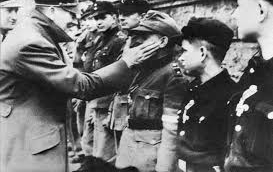Why didn’t the top Wehrmacht units try to save Hitler during the Battle of Berlin?
Why didn’t the top Wehrmacht units try to save Hitler during the Battle of Berlin? The top Wehrmacht units did not attempt to save Adolf Hitler during the Battle of Berlin for several key reasons:
Hitler’s Refusal to Leave:
Adolf Hitler himself refused to leave Berlin. By April 1945, he had accepted the inevitability of defeat but was determined to stay in the city. Even when some high-ranking officials suggested that he leave for the Alpine region or continue leading the war from another location, he chose to stay in his Führerbunker beneath the Reich Chancellery. Without Hitler’s willingness to leave, any attempts at rescue were essentially pointless.
Disintegration of the Wehrmacht:
By the time of the Battle of Berlin, the Wehrmacht was in disarray. The German military was severely weakened after years of losses on the Eastern and Western fronts, and the forces defending Berlin were a mix of regular troops, Volkssturm (militia made up of old men and boys), and SS units. Many of the elite Wehrmacht units had already been destroyed or were too far from Berlin to mount any kind of effective rescue operation.
Encirclement by the Soviets:
Berlin was completely encircled by Soviet forces during the final stages of the war. The Red Army’s 1st Belorussian and 1st Ukrainian Fronts had surrounded the city, making any rescue or relief operation nearly impossible. The last significant German force capable of potentially mounting a relief effort, the 12th Army under General Walther Wenck, was forced to fight on multiple fronts and was eventually too weak to break through the Soviet lines.
Leadership Collapse and Fragmentation:
The German leadership was divided and paralyzed by the impending collapse. Many high-ranking Nazi officials, including Heinrich Himmler and Hermann Göring, were either trying to negotiate surrender with the Allies or had fled. This lack of unified command contributed to the Wehrmacht’s inability to organize a coordinated effort to save Hitler.
Focus on Survival:
By April 1945, many Wehrmacht officers and soldiers were more concerned with their own survival than with defending Hitler. The hopelessness of the situation led to a collapse in morale. Some commanders, such as General Wenck, prioritized saving civilians and soldiers trapped in Berlin rather than launching a suicidal mission to save Hitler.
Hitler’s Direct Orders:
Hitler explicitly ordered his commanders not to launch any attempts to rescue him. He believed that his fate was sealed and that he would die in Berlin. He had also long harbored a belief in a final act of defiance in the event of defeat, and in the final days of the war, he made preparations for his suicide.
In summary, a combination of Hitler’s own decisions, the overwhelming strength of the Soviet forces, the disintegration of the Wehrmacht, and the collapse of Nazi leadership made any effort to save Hitler during the Battle of Berlin impossible.


